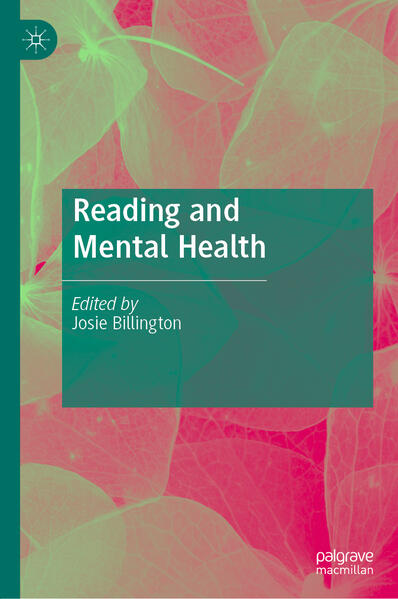
Zustellung: Mi, 29.01. - Sa, 01.02.
Versand in 1-2 Wochen
VersandkostenfreiBestellen & in Filiale abholen:
This book brings together into one edited volume the most compelling rationales for literary reading and health, the best current practices in this area and state of the art research methodologies. It consolidates the findings and insights of this burgeoning field of enquiry across diverse disciplines and groups: psychologists, neurologists, and social scientists; literary scholars, writers and philosophers; medical researchers and practitioners; reading charities and arts organisations.
Following introductory chapters on the literary-historical background to reading and health, the book is divided into four key sections. The first part focuses on Practices, showcasing reading interventions and cultures in clinical and community mental health care and in secure settings. This is followed by Research Methodologies, featuring innovative qualitative and quantitative approaches, and by a section covering Theory, with chapters from eminent thinkers in psychiatry, psychology and psychoanalysis. The final part is concerned with Implementation, incorporating perspectives from health professionals, commissioners and reading practitioners.
This innovate work explains why reading matters in health and wellbeing, and offers a foundational text to future scholars in the field and to health professionals and policy-makers in relation to the embedding of reading practices in professional health care.
Inhaltsverzeichnis
Chapter One. Introduction; Josie Billington. - PART ONE; READING AND HEALTH: MEDICINE TO LITERATURE, LITERATURE TO THERAPY. - Chapter Two. Comfort in a Whirlwind; Christopher Dowrick. - Chapter Three. The Sonnet Cure: Renaissance Poetics to Romantic Prosaics; Grace Farrington and Philip Davis. - Chapter Four. The Victorian Novel: Laying the Foundations for `Bibliotherapy ; Grace Farrington, Philip Davis and Josie Billington. - PART TWO; PRACTICES. - Chapter Five. Reading for Depression/Mental Health; Clare Ellis, Eleanor McCann, Anne Line Dalsgård. - Chapter Six. Reading for Dementia; Katie Clarke, Charlotte Weber, Susan McLaine. - Chapter Seven. Reading in Prisons; Alexis McNay, Charlie Darby-Villis, Ann Walmsley. - Chapter Eight. Reading in Clinical Contexts; Grace Farrington, Kate McDonnell and Helen Cook. - PART THREE; RESEARCH METHODOLOGIES. - Chapter Nine. Qualitative Methodologies I; Jude Robinson and Josie Billington, Ellie Gray and Gundi Kiemle, Melissa Chapple. - ChapterTen. Qualitative Methods II; Josie Billington and Philip Davis, Mette Steenberg, Grace Farrington and Fiona Magee, Thor Magnus Tangeraas, Kelda Green. - Chapter Eleven. Linguistic Approaches; Sofia Lampropulou and Kremena Koleva, Josie Billington, Philip Davis, Gavin Brookes and Kevin Harvey. - Chapter Twelve. Quantitative Methodologies; Rhiannon Corcoran, Josie Billington and Megan Watkins, Mette Steenberg, Charlotte Christianson, Nikolai Ladegaard, Don Kuiken. - Chapter Thirteen. Reading: Brain, Mind and Body; Philip Davis, Rhiannon Corcoran, Rick Rylance and Adam Zeman, David Kidd, Christophe de Bezenac. - PART FOUR; TOWARDS A THEORETICAL UNDERSTANDING OF READING AND HEALTH. - Chapter Fourteen. Reading and Psychiatric Practices; David Fearnley and Grace Farrington. - Chapter Fifteen. Reading and Psychology I, `Reading Minds: Fiction and its Relation to the Mental Worlds of Self and Others ; Rhiannon Corcoran and Keith Oatley. - Chapter Sixteen Reading and Psychology II, `Metaphoricity, Inexpressible Realizations, and Expressive Enactment ; Don Kuiken. - Chapter Seventeen. Reading and Psychoanalysis; Adam Phillips, Philip Davis. - PART FIVE; READING AND HEALTH: IMPLEMENTATION - BARRIERS AND ENABLERS. - Chapter Eighteen. Reading and Mental Health; Ellie Gray, Grace Farrington, Mette Steenberg. - Chapter Nineteen. Reading and Dementia; Martin Orrell and Tom Dening, Nusrat Husain, Sally, Rimkeit, Gill Claridge, Dalice Sim. - Chapter Twenty. Reading in Prisons; Fiona Magee. - Chapter Twenty One. Reading in a Clinical Context Reading and Chronic Pain; Kate McDonnell.
Produktdetails
Erscheinungsdatum
19. September 2019
Sprache
englisch
Auflage
1st ed. 2019
Seitenanzahl
480
Herausgegeben von
Josie Billington
Verlag/Hersteller
Produktart
gebunden
Abbildungen
XIX, 455 p. 11 illus., 7 illus. in color.
Gewicht
881 g
Größe (L/B/H)
241/160/32 mm
Sonstiges
HC runder Rücken kaschiert
ISBN
9783030217617
Entdecken Sie mehr
Bewertungen
0 Bewertungen
Es wurden noch keine Bewertungen abgegeben. Schreiben Sie die erste Bewertung zu "Reading and Mental Health" und helfen Sie damit anderen bei der Kaufentscheidung.









